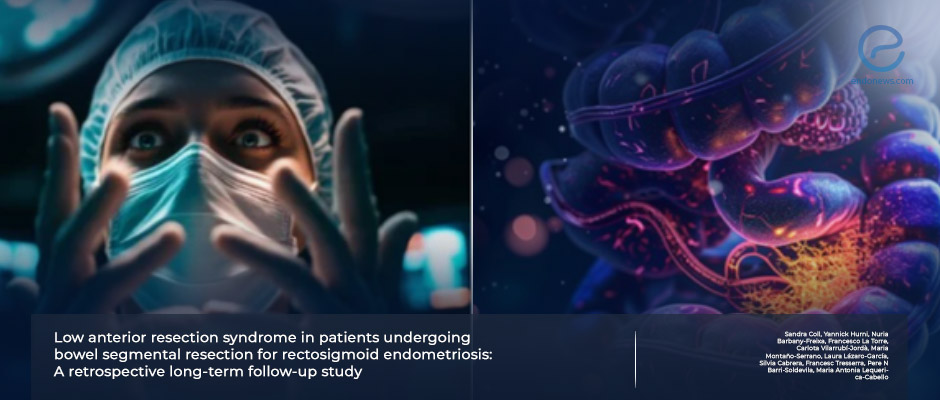Low Anterior Resection Syndrome (LARS) Risk Following Rectosigmoid Endometriosis Surgery
May 29, 2025
Surgeons Urged to Weigh LARS Risk When Treating Rectosigmoid Endometriosis
Key Points
Highlights:
- Most patients do not develop major "Low Anterior Resection Syndrome (LARS), suggesting that conservative and nerve-sparing surgical approaches may protect bowel function.
- Parametrial resection during segmental bowel surgery significantly increases the risk of postoperative LARS.
- Recurrence of endometriosis remains a clinical challenge despite segmental resection, reinforcing the need for vigilant follow-up.
Importance:
- Colorectal surgery for rectosigmoid endometriosis may lead to bowel dysfunction including LARS, which affects quality of life and should be part of preoperative counseling.
- Identifying modifiable surgical risk factors, especially related to parametrial dissection, is critical for improving long-term outcomes in women with deep infiltrating endometriosis.
What's done here
- This retrospective observational study from a tertiary referral center in Spain examined the prevalence and predictors of LARS after segmental resection for rectosigmoid endometriosis.
- Data from 124 women treated between 2008-2023 were analyzed to identify risk factors for postoperative LARS and assess complications and disease recurrence.
Key Results:
- Within 12 months post-surgery, 2 patients developed minor LARS and 5 developed major LARS, a total percentage of 5.6.
- Severe surgical complications occurred in 10 cases (8%), including anastomotic dehiscence, rectal stenosis, hemoperitoneum, and urinoma (no rectovaginal fistulas were observed).
- Endometriosis recurrence was identified in 37 patients via postoperative ultrasound, with 20 reporting return of symptoms.
- Parametrial resection was the only independent predictor of LARS, with an odds ratio of 6.2 (95% CI: 1.1–35.4, p = 0.004) in multivariate analysis.
From the Editor-in-Chief – EndoNews
"The long-term functional consequences of deep endometriosis surgery are gaining overdue attention. This important study reinforces that while segmental bowel resection may be necessary in select cases of rectosigmoid endometriosis, it is not without risk. The development of low anterior resection syndrome (LARS), although infrequent, underscores the importance of preserving pelvic nerve integrity — especially when parametrial dissection is considered. As surgical teams strive to balance disease eradication with quality-of-life outcomes, this study reminds us that conservative, nerve-sparing approaches should remain the default, not the exception."
Lay Summary
Colorectal surgery for deep endometriosis can sometimes lead to a condition called "Low Anterior Resection Syndrome (LARS)" — a combination of bowel symptoms like frequent urges to defacate, stool fragmentation, and fecal incontinence. These symptoms occur due to impaired rectal reservoir function, altered motility, and possible damage to nerves or structures involved in bowel control.
Although several factors are known to increase the risk of LARS, such as a short distance between the anastomosis and the anal verge, previous radiotherapy or chemotherapy, a surgical technique called total mesorectal excision, and, as shown in this study, parametrial resection; the impact of surgery for rectosigmoid endometriosis on bowel function remains a topic of ongoing investigation. As awareness of these risks grows, many surgeons now aim to limit colorectal segmental resections unless clearly necessary, particularly in patients with deep infiltrating endometriosis affecting the rectosigmoid colon.
A team of researchers from Dexeus University Hospital in Barcelona, Spain, led by Dr. Coll, sought to better understand how often LARS occurs after such surgery and what factors predict its development. They conducted a retrospective study of 124 women treated over a 16-year period in their tertiary care center.
The results were reassuring: only 7 patients (5.6%) developed LARS — 2 with minor and 5 with major symptoms — within the first postoperative year. Major complications were rare, and no rectovaginal fistulas were reported. Importantly, parametrial resection emerged as the only independent predictor of LARS in their analysis.
This study supports the evolving surgical trend toward nerve-sparing, anatomy-preserving techniques in the treatment of colorectal endometriosis. Surgeons are encouraged to balance the benefits of disease excision with the risks of long-term functional impairment. The authors also call for larger prospective studies to confirm these findings and further refine surgical decision-making.
This work was recently published in Colorectal Disease.
Research Source: https://pubmed.ncbi.nlm.nih.gov/40328510/
bowel dysfunction bowel resection low anterior resection syndrome rectal anastomosis fecal incontinence urgency endometriosis.

